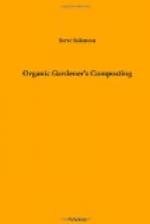Much simpler bins can be constructed out of 2” x 4” mesh x 36” or 48” high strong, welded wire fencing commonly called “turkey wire,” or “hog wire.” The fencing is formed into cylinders four to five feet in diameter. I think a serious gardener might need one five-foot circle and two, four-foot diameter ones. Turkey wire is stiff enough to support itself when formed into a circle by hooking the fencing upon itself. This home-rolled wire bin system is the least expensive of all.
As compostable materials are available, the wire circle is gradually filled. Once the bin has been loaded and has settled somewhat, the wire may be unhooked and peeled away; the material will hold itself in a cylindrical shape without further support. After a month or two the heap will have settled significantly and will be ready to be turned into a smaller wire cylinder. Again, the material is allowed to settle and then, if desired, the wire may be removed to be used again to form another neatly-shaped heap.
Wire-enclosed heaps encourage air circulation, but can also encourage drying out. Their proper location is in full shade. In hot, dry climates, moisture retention can be improved by wrapping a length of plastic sheeting around the outside of the circle and if necessary, by draping another plastic sheet over the top. However, doing this limits air flow and prevents removal of the wire support You may have to experiment with how much moisture-retention the heap can stand without going anaerobic. To calculate the length of wire (circumference) necessary to enclose any desired diameter, use the formula Circumference = Diameter x 3.14. For example, to make a five-foot circle: 5 x 3.14 = approximately 16 feet of wire.
With the exception of the “tumbler,” commercially made compost bins are derived from one of these two systems. Usually the factory-made wire bins are formed into rectangles instead of circles and may be made of PVC coated steel instead of galvanized wire. I see no advantage in buying a wire bin over making one, other than supporting unnecessary stages of manufacture and distribution by spending more money. Turkey wire fencing is relatively inexpensive and easy enough to find at farm supply and fencing stores. The last time I purchased any it was sold by the lineal foot much as hardware cloth is dispensed at hardware and building supply stores.
Manufactured solid-sided bins are usually constructed of sheet steel or recycled plastic. In cool climates there is an advantage to tightly constructed plastic walls that retain heat and facilitate decomposition of smaller thermal masses. Precise construction also prevents access by larger vermin and pets. Mice, on the other hand, are capable of squeezing through amazingly small openings. Promotional materials make composting in pre-manufactured bins seem easy, self-righteously ecological, and effortless. However, there are drawbacks.




